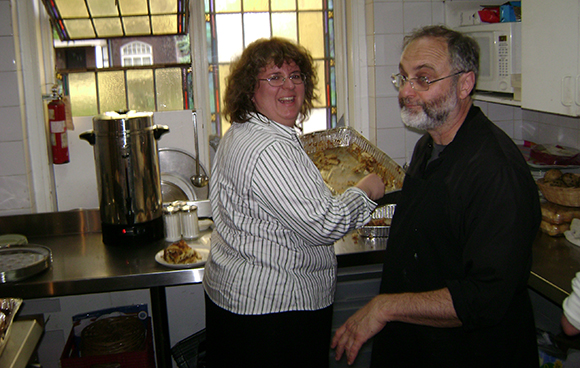
St. John the Compassionate Mission opened its doors on January 30, 1986. We first began by renting a small store on 53 Blake Street in the middle of a densely-populated public housing project. The opening day was an act of trust in God’s desire to plant a presence of Faith, Hope and Love in that needy neighbourhood.
We had 500 dollars in the bank.
Initially established as a mission-parish of the Ukrainian Catholic Eparchy of Toronto, later in 2001 under Bishop Cornelius it was transferred to the Carpatho-Russian Orthodox Church under the late Metropolitan Nicolas. Since the beginning, all services have been conducted in English. The community has always included people of many cultural, social and religious backgrounds. We learn to understand and respect each other through our common work and respectful dialogue. The community was linked for many years with Pain de Vie and received much of its early inspiration from exchanges with this international lay community.
In 1995, after a period of being homeless for one year, we moved out of Blake Street and with the help of friends, in particular Fr. John Tataryn of St. Demetrius Church, found our present permanent home on Broadview Avenue. This place is large enough to accommodate all our needs. All the renovation work in the building, including the chapel, was done by volunteers, some from far away as France.
Have a peek at our St. John’s Mission History video.
Our purpose is to be and to build an inclusive community through the gifts and the needs that each of us brings. This Community of Love is a place of healing and nourishment occurring through awakening the God-given dignity and value of each person, while responding to each person’s needs.
St. John the Compassionate Mission was founded in Toronto’s east end in 1986, providing meals and a wide range of programs to marginalized individuals, in a nurturing community setting. St. John’s operates two successful non-profit social enterprises – a bakery and a thrift shop – which provide valuable work experience, training, and dignity for workers, many of whom are homeless or on social assistance. The bread has won several city awards as the best bread in Toronto.
The Mission is open to all. Over the years, the population downtown has changed. Today, many of the people who come to the mission are homeless and struggling with addiction.
We run the only breakfast program in the city that opens its doors at 5 a.m. We also seek to be a positive presence in a changing neighbourhood.
The Mission is open to all. We encourage people living in the area – homeless or not, rich or poor – to see the Mission as a community space where people of different backgrounds and needs can feel welcome and needed. We encourage every one of our neighbours to come, to share food or conversation, and to get to know each other as people. The needs may look different, depending on our social status, but our common humanity joins all of us in a common search. We believe this common search is about meaning and transcendence, as well as bread.
Many of the poor families that used to come to the Mission at its beginning are now living in Scarborough, pushed out by high cost of housing in the downtown core. In 2016, the Mission opened a new location in the Scarborough Village area (called Good Neighbours Drop-in) and St. Zoticos Mission Church.


Work is not only an economic necessity but a basic human need. One of the best ways to kill the inner spirit of a person is to pay them to do nothing.
At the Mission, we witness that it is through work that our humanity can also be restored. Unpaid work is a noble and fulfilling human experience.
There is no such a thing as meaningless work, when lived in a community.
Many times, people who are poor are thought to focus on what they don’t have, and not on what they have that can be shared.
We create at the Mission a real culture where everyone is encouraged to share their gifts and ‘who they are are.’ These gifts are not only encouraged, but needed. People are made to feel that they are needed and not just ‘in need.’ This vision of life restores equality between those of us who often see the poor as either objects of pity or people to look down on. We believe that such an ‘oasis’ in our culture and city does in fact contribute to a better society for all.